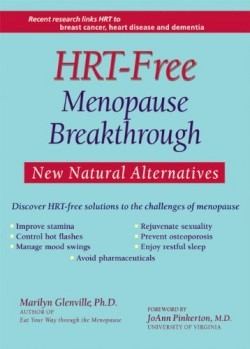
The HRT-Free Menopause Breakthrough
The New Natural Alternatives
“Too many doctors see women as a collection of hormones,” writes the author, “and thus regard the menopause as a deficiency disease that needs to be corrected by replenishing declining levels of oestrogen. Always bear in mind, however, that it is not an illness requiring treatment but a natural event in a woman’s life.”
That little jewel is tucked onto the end of this book’s foreword, but perhaps it should have been in bold type on its own page. For the thousands of women who are confused about treating the symptoms of menopause, just those words of clarification could make a big difference in the choices they make, and that is the purpose of this book: to help women make good choices about health care.
Expanding on the information that was in her previous book, The HRT-Free Menopause Breakthrough; The New Natural Alternatives, Glenville, a nutritionist and psychologist with a PhD from Cambridge, incorporates new research on the benefits and drawbacks of Hormone Replacement Therapy (HRT). In recent years there have been conflicting reports from the medical field, and Glenville includes the latest studies that show little benefit for HRT and some serious side effects, including a greater risk of breast cancer.
In the chapter “Your Breasts at the Menopause,” she questions the benefits of mammograms in screening for breast cancer. “Results of a ten-year study of 600,000 Swedish women were published in The Lancet in 2001 that concluded that ‘screening for breast cancer with mammography is unjustified’ and for every breast cancer death avoided, the total number of deaths increased by six.” According to this study, the problem of yearly mammograms is the exposure to radiation, which has long been known to increase the risk of cancer. Women are encouraged to seek alternatives such as ultra-sound for screening and dietary changes to help prevent cancer.
Other chapters offer suggestions for herbal and dietary treatments of menopause symptoms such as hot flashes, mood swings, and weight gain. Some of those hints are presented in “information boxes,” which contain helpful facts about such things as diet and exercise. The boxes are written in a more relaxed style that will appeal to readers who may be daunted by the academic style of the rest of the writing, which almost calls for a college degree to wade through the verbiage to find the gems. That’s too bad. The gems are plentiful and all women could benefit from this information about the latest medical research that affects their health care.
Reviewed by
Maryann Miller
Disclosure: This article is not an endorsement, but a review. The publisher of this book provided free copies of the book to have their book reviewed by a professional reviewer. No fee was paid by the publisher for this review. Foreword Reviews only recommends books that we love. Foreword Magazine, Inc. is disclosing this in accordance with the Federal Trade Commission’s 16 CFR, Part 255.
